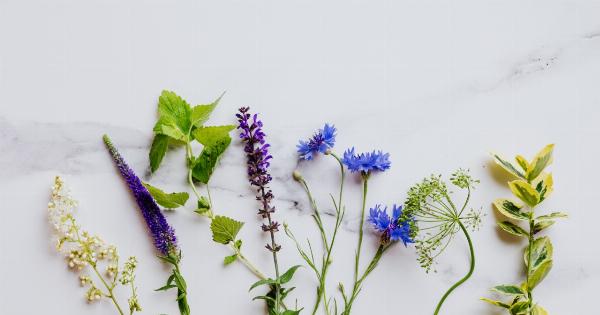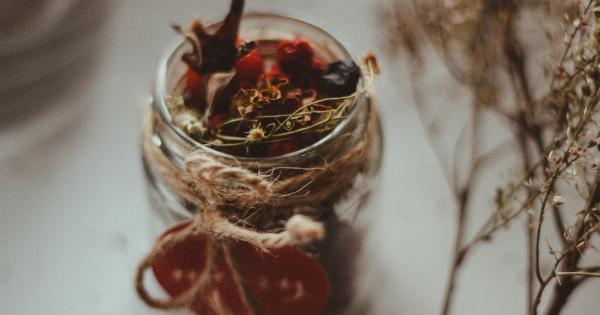For many people, getting a good night’s sleep can feel like an elusive dream. Tossing and turning, racing thoughts, and restless legs are all too common when the lights go out.
This lack of quality sleep can have a profound impact on our daily lives, affecting our mood, cognition, and overall well-being. While there are numerous factors that can contribute to sleep disturbances, one potential solution lies in the power of herbs. In this article, we will explore ten herbs that can help you achieve a more restful and rejuvenating slumber.
1. Valerian Root
Valerian root, also known as nature’s Valium, has long been used as a natural remedy for insomnia and anxiety.
This herb promotes relaxation by increasing levels of gamma-aminobutyric acid (GABA), a neurotransmitter that helps calm the brain and nervous system. Valerian root is most commonly consumed in capsule or tea form, and its sedative effects make it ideal for those struggling with sleep onset.
2. Chamomile
Chamomile, a member of the daisy family, has been cherished for centuries due to its calming properties.
This herb is often consumed as a tea and contains compounds like apigenin that bind to receptors in the brain, promoting relaxation and reducing anxiety. Chamomile also has mild sedative effects, making it an excellent addition to your bedtime routine.
3. Lavender
The soothing scent of lavender has long been associated with relaxation and stress reduction. Studies have shown that essential oil derived from lavender can lower heart rate, blood pressure, and stress levels.
By inhaling lavender essential oil or using it in a diffuser, you can create a calm and serene environment that promotes better sleep.
4. Passionflower
Passionflower, a vibrant flowering plant, has a history of use in traditional medicine for its calming and sleep-inducing effects. The herb contains compounds that enhance GABA levels in the brain, reducing anxiety and promoting better sleep quality.
Passionflower can be consumed as a tea, tincture, or taken in capsule form to aid with relaxation and a peaceful sleep.
5. Lemon Balm
Lemon balm, a member of the mint family, is known for its lemony scent and calming effects. This herb has been used for centuries to reduce anxiety and promote restful sleep.
Lemon balm contains compounds like rosmarinic acid, which have been shown to increase GABA levels in the brain, inducing relaxation and tranquility. Enjoy lemon balm tea before bedtime for a more peaceful slumber.
6. California Poppy
California poppy, a vibrant orange wildflower, has been used traditionally as a sedative and pain reliever. It contains alkaloids that interact with the brain’s receptors, promoting relaxation and sleepiness.
California poppy can be taken as a tincture or in capsule form to help quiet the mind and foster deep, uninterrupted sleep.
7. Ashwagandha
Ashwagandha, an adaptogenic herb commonly used in Ayurvedic medicine, has a wide range of health benefits, including improved sleep quality and reduced stress levels.
This herb helps regulate cortisol, a hormone that plays a role in the sleep-wake cycle. By reducing stress and anxiety, ashwagandha promotes better sleep and overall well-being.
8. Skullcap
Skullcap, a perennial herb, has sedative properties that make it an excellent choice for those struggling with insomnia or anxiety-related sleep disturbances.
This herb contains compounds like flavones that bind to GABA receptors, promoting relaxation and sleepiness. Skullcap can be consumed as a tea or taken in tincture form to aid in achieving restful sleep.
9. Hops
Hops, known primarily for their use in beer brewing, also have sedative properties that make them a valuable sleep aid. The bitter acids in hops extract act as mild sedatives that promote sleepiness and relaxation.
Hops are commonly consumed in combination with other herbs, such as valerian root or chamomile, to enhance their sleep-inducing effects.
10. St. John’s Wort
St. John’s Wort, a flowering plant native to Europe, is commonly used as a natural remedy for depression and anxiety. Improved mental health can significantly impact sleep quality, making St. John’s Wort a potential herb to consider.
However, it’s important to note that this herb may interact with certain medications, so consulting with a healthcare professional is crucial before use.
Conclusion: Embrace the Power of Herbs for a Restful Night’s Sleep
When counting sheep no longer does the trick, turning to herbs can provide a natural and effective solution for achieving a more restful and rejuvenating slumber.
Whether you prefer valerian root for its sedative effects, chamomile for its calming properties, or lavender for its soothing scent, the power of herbs can help you bid farewell to sleepless nights. Remember to consult with a healthcare professional before incorporating herbs into your bedtime routine, especially if you have underlying medical conditions or are taking any medications.
Embrace the blissful power of bedtime herbs and let each night be filled with restorative sleep.






























